Ed Wool and The Nomads were an American rock band from Watertown, New York led by Ed Wool, who were active in the 1960s and early 1970s. At the time, they were one of the most popular bands in northern upstate New York and also recorded under other names such as the Sure Cure and the Pineapple Heard, eventually becoming Wool, and recording a self-titled album under that name in 1969. They briefly reunited for two shows in 2007 and 2008.

The Savages were a garage rock band from Bermuda that were active in the mid-1960s. They are best remembered for their album, Live 'n Wild, which was composed largely of self-penned tunes and recorded in front of a live audience, has been mentioned as a seminal work in the genre, and features the song, "The World Ain't Round It's Square". This song has become regarded as a classic 1960s anthem of youthful defiance.
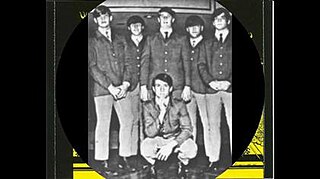
The Lemon Fog were an American garage rock/psychedelic rock band from Houston, Texas who were active from 1965–1970. They were one of the earliest bands to emerge from the Houston psychedelic scene, and recorded several singles for Orbit Records. The group also recorded a handful of outtakes and demos which, along with their issued singles, have been released on the anthology The Psychedelic Sound Of Summer With The Lemon Fog.
The Mad Hatters were an American garage rock band from Annapolis, Maryland who were active in the 1960s and had a following in the Washington DC and Baltimore area. They enjoyed brief local and regional success with their first single, "I Need Love," released in 1965, later recorded by the Time Stoppers. Though they failed to reach a wider audience, in the intervening years since their breakup they have become known amongst garage rock collectors and enthusiasts. Their 1966 song "I'll Come Running" has also become a song highly regarded amongst enthusiasts.

The Liberty Bell was an American garage rock/psychedelic rock band from Corpus Christi, Texas who were active in the 1960s. They specialized in a blues-based brand of proto-punk influenced by British groups such as the Yardbirds. The band failed to reach wider audience in the time, but have come to the attention of garage rock collectors and enthusiasts in the intervening years since their breakup, with their work appearing on several compilations.

The Stillroven were an American garage rock and psychedelic band from Robbinsdale, Minnesota, outside of Minneapolis, who were active in 1965–1969. They became a local success, enjoying a hit in the Twin Cites area with their version of "Hey Joe". In hopes of reaching a wider audience they relocated, playing for a short time in Tucson, Arizona, but eventually moved their base of operations to Denver, Colorado, where they briefly signed to A&M Records, recording an unreleased album for the label. The group made recordings at Norman Petty's studio in Clovis, New Mexico, before moving to Washington, DC in 1969 and auditioning in New York City to secure another recording arrangement that never materialized. In the intervening years since their breakup in 1969, the group's work has attracted the attention of garage rock and psychedelic enthusiasts and has been included on various re-issues and compilations.
The Penthouse 5 were an American garage rock band from Oak Cliff, Texas, a suburb of Dallas and were active from 1964-1967. The band's style was highly influenced by popular British acts like the Beatles and the Kinks, as well as the folk rock of the Byrds. In 1967 they shortened their name to the Penthouse and also began to play occasional gigs with a horn section as a soul outfit under the name of Dr. William’s Soul Emporium.
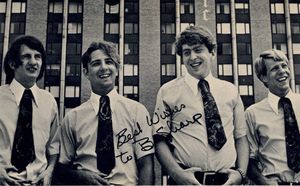
T.C. Atlantic was an American garage rock/psychedelic rock band from Minneapolis, Minnesota who were active in the 1960s. They were one of the most popular groups in the Twin Cities, but failed to break nationally. In the intervening years since their breakup, their recordings have attracted the interest of '60s music collectors and enthusiasts, and they are particularly remembered for their 1966 fuzz-tinged song, "Faces", which has been mentioned as one of the earliest garage rock songs to display psychedelic characteristics.
The Outsiders were an American garage rock band from Tampa, Florida who were active in the 1960s. They are not to be confused with the better-known group, the Outsiders, from Cleveland, Ohio, nor with The Outsiders from the Netherlands, both of whom were active at the same time.

Sir Winston and the Commons were an American garage rock band formed in Indianapolis, Indiana, in 1963. The group released two highly regarded singles, which, upon release, earned the band a regional following, and resulted in reinterest in their music over the years. At the height of their popularity, Sir Winston and the Commons were regulars at the teen dance club the Cellar, in Chicago.
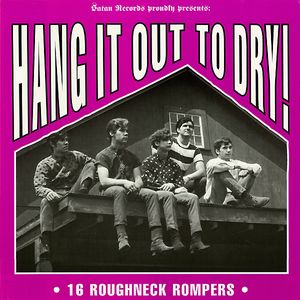
Hang It Out to Dry! is a compilation of garage rock recordings from the 1960s first issued by Satan Records in 1994 which is available in two versions, both on LP and in extended form on CD. It features some of the more upbeat and rocking examples of the genre.
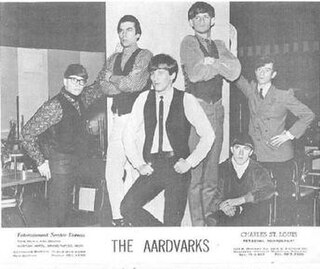
The Aardvarks were an American garage rock band from Muskegon, Michigan who were active between 1964-1968. They recorded three singles, two of which were issued on labels of Dave Kalmback's Fenton Records based in Sparta, Michigan. The group scored a local hit with "I'm Higher than I'm Down", which is now considered a garage rock classic, and several of their songs have been included in garage rock compilations.

The Escapades were an American garage rock band from Memphis, Tennessee who were active in the 1960s. They became one of the most popular groups in the Memphis area during the mid-1960s and recorded two singles. "I Tell No Lies", the A-side of their debut single, became a big hit in Memphis and around the South. They were signed to Verve Records, who released their follow-up, "Mad, Mad, Mad", which featured a fuzz-toned guitar line. Their work is highly regarded by garage rock enthusiasts and collectors and has appeared on various compilations.
The Breakers were an American garage rock band from Memphis, Tennessee who were active in the 1960s. They became one of the most popular bands in the Memphis area and enjoyed considerable success with their regional hit "Don't Bring Me No Flowers ". There has been a resurgence of interest in the Breakers amongst garage rock collectors and enthusiasts in recent years.
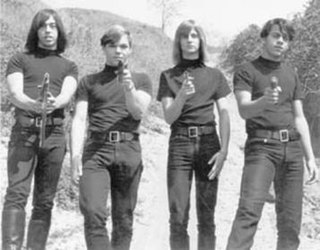
Public Nuisance was an American rock band from Sacramento, California who were active from 1964-1970, first as Moss & the Rocks, then later as Public Nuisance. In 1965 they recorded the song "There She Goes" as Moss & the Rocks for a single released on the local Icon label. After changing their name to Public Nuisance in 1967, they began to incorporate psychedelic elements into their sound and a series of mostly unreleased songs recorded at various sessions from 1968-1969 that went for years unissued, but finally saw the light of day in 2002 with the release of the Gotta Survive anthology. Since then, their work, both as Moss & the Rocks and Public Nuisance, has attracted the attention of garage rock and psychedelic enthusiasts worldwide.
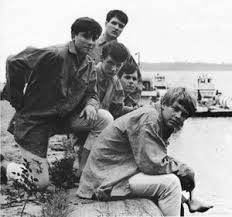
Lawson and Four More were an American garage rock/psychedelic rock band from Memphis, Tennessee, who were active in the 1960s. The group was led by Bobby Lawson and was known for their hard, blues-based sound which, as they evolved, increasingly incorporated esoteric psychedelic elements. The group regularly worked with musician, songwriter, and producer Jim Dickinson and cut the first rock release for Memphis label, Ardent Records. As a side-project, they briefly recorded under the name The Avengers, as a Batman-themed takeoff group in 1966.
Randy and the Radiants were an American garage rock band from Memphis, Tennessee who were active from 1962 to 1966 and then again 1976–1984. They were one of the most popular groups in the Memphis area during the 1960s. Through their association with Knox Phillips, son of Sam Phillips, they signed with Sun Records and recorded two singles on the label which became hits in the region. Their second release, "My Way of Thinking", became one of the top hits in the area, reaching #1 on WGMN's charts. The group's work has today become highly regarded amongst garage rock enthusiasts and collectors.

The Dagenites were an American garage rock a band from Oxon Hill, Maryland near Washington, DC, who were active in the 1960s. They shared management and frequent billing with noted guitarist and performer Link Wray. In recent years their work has become highly regarded amongst garage rock enthusiasts and collectors and has been included on several compilations. The Dagenites are especially known for their proto-punk anthems, "I Don't Want to Try it Again" and "I'm Gone Slide", both of which have been mentioned as garage rock classics.

The Kings Ransom were an American garage rock band from Allentown, Pennsylvania who were active from 1965 to 1968 and were a popular act in the Lehigh Valley area, as well as around Philadelphia. Their record "Shame" became a hit in Milton, Pennsylvania and received airplay in Michigan. In the intervening years the Kings Ransom's music has come to the attention of garage rock enthusiasts with the release of several of their songs on compilations such as Allentown Anglophile and Teenage Shutdown! Teen Jangler Blowout!
Danny and the Counts were an American garage rock band from El Paso, Texas, who were active in the 1960s. They had a local hit with their 1965 R&B-flavored debut single, "For Your Love", but afterward switched their approach to reflect British Invasion influence. In 1966 they released a single on Coronado Records featuring the two songs for which they have become best-known, "You Need Love" and "Ode to the Wind". In the intervening years their work has come to be highly regarded by garage rock enthusiasts.













